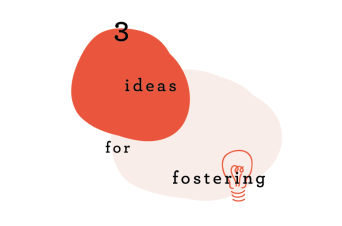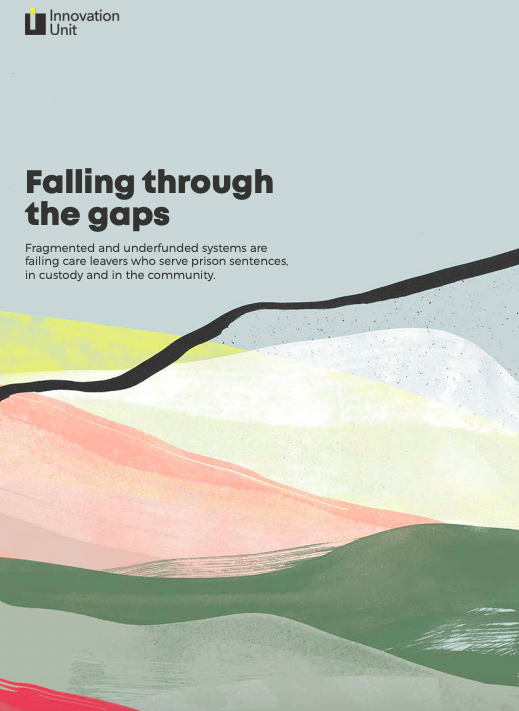
Falling through the gaps – new research into care leavers’ experiences
blog | Words Ella Walding | 28 Feb 2019
A new research report reveals key insights about the experiences of care leavers leaving prison, and the opportunities and challenges they face following release.
Care leavers are vastly over-represented in our justice system. Children in care and care leavers account for less than 1% of the general population, yet over 25% of the adult prison population has been in care. While the state spends thousands on some of these young adults, their outcomes are consistently poor: half of care leavers have mental health needs and a quarter face mental health crises.
Innovation Unit is being funded by the Oak Foundation to understand the lived experience of care leavers in prison and following release, and the experience of those that support them. We want to see 18-25 year old care leavers break the reoffending cycle, help them flourish, and fulfil their aspirations. Achieving this goal is complex and this is partly because so many different organisations are charged with providing support; from local government to children’s social care, the criminal justice system to health, and many more.
For the past six months we have been gathering in-depth stories about people’s experiences from across the system, to understand the challenges care leavers face, as well as the strengths and resources they have to draw upon.
Our report, published today, highlights six key insights which describe what is working well and the problems that care leavers often face.
“This report shows the value of really taking time to listen. There’s no shortage of guidance about care leavers who end up in prison, but it’s not making the difference it should. The insights of the people living with the reality of that failure shows why. The same people will be able to describe how to fix things – we need to keep listening.”Peter Dawson
CEO, Prison Reform Trust
Download the full report here.
SIX KEY INSIGHTS
1. A combination of factors result in care leavers having a higher risk of reoffending on release than non-care leavers.
Care leavers are an extremely vulnerable group, the majority of which have experienced past trauma, abuse and neglect, and a range of other problems. It is not a coincidence that the prison population is full of so many care experienced young adults, their traumatic childhood experiences can manifest as negative coping strategies which can lead to law breaking. They can also lack the lack supportive loving relationships and guidance that other young adults have, and can make unhealthy relationships in order to belong. Children in care homes are more likely to come into contact with the police for minor offences which increases chances of them developing a police record once leaving care, resulting in subsequent law breaking which can lead to prison sentences.
2. Fragmented and uncoordinated support and intervention from social care and rehabilitation services results in increased vulnerability.
There is currently no clear overarching vision, strategy or outcomes for this group across government departments, which would allow frontline practitioners to collaborate around a common planning and practice framework. Furthermore, the multiple practitioners in the system do not always communicate well with each other about care leavers, resulting in a lack of clarity about what support should be provided. The young adults supported by the system feel this impact acutely, often being given extremely short notice of what will happen to them next, be that a move to another prison or where they might live when release is imminent.
3. There are different practice frameworks and cultures which means that there is no shared philosophy about how care leavers should be supported.
Different cultures between local authorities and the criminal justice system means that services for care leavers are fragmented and sometimes work to different agendas and aims. This makes it hard for staff to work together and hard for care leavers to understand the rules of the systems they are in. There is also confusion in both systems about what the response of the system should be once a care leaver turns 18. It is not clear whether care leavers should be treated as adults or have allowances made for them.
4. The experience of prison, and the label of being an offender, is a barrier to effective rehabilitation.
Prison can be a traumatising experience leaving care leavers feeling stigmatised, isolated, anxious and abandoned. Upon leaving prison, having the label of an ‘offender’ makes it very hard to access safe housing, education and employment, which is fundamental for their effective rehabilitation. This stigma and the absence of ongoing support means a high proportion of care leavers then go onto re-offend.
5. There are not enough resources to meet care leavers needs.
The resources available in the justice and health systems and local authorities aren’t enough to allow staff to give care leavers the time and support they feel is needed to help them thrive. Every person we met cared deeply and wanted to make a difference to care leavers’ lives. However, both local authority and CRC staff report having high caseloads and not having the time, or the resources, to provide the level of support they felt was required. Staff also recognised that the time in prison could be an opportunity to make a real difference to care leavers’ lives and help them to rehabilitate, but this wasn’t always used effectively.
“I need a permanent place to stay so I can try and rebuild my life. They have already tried to recall me because I have moved three times – just moving out of the places that they put me in that weren’t safe – they set me up to fail. I want to get a new place, get a steady job, get better education. I want to be a positive person. I want to be a good role model for my younger brother. I need someone to help put me in the right direction and show me what to do, how to not go back to prison.”Andy
Care leaver (name has been changed)
6. Despite system conditions, there are pockets of good practice
Despite systemic challenges, committed individuals and teams are making small strides towards improved support for care leavers. The staff we spoke to were passionate and dedicated, and we have been blown away by the enthusiasm we have seen over the course of this project. There is also a range of national and local initiatives that are having impact and improving outcomes for care leavers.
WHAT’S NEXT?
These young adults are the responsibility of the State, yet diminishing resources and fragmented systems lead to many falling through the gaps. People want to do more but the system isn’t allowing them to do so. This research reveals that there is now a real opportunity to develop integrated approaches, at a national and local level, to develop a shared vision on how to work with this group of young adults, and help them to flourish.
Innovation Unit is now seeking funding to co-design new solutions with partners and care leavers in the West Midlands. The aim is to encourage different services to come together and provide wrap-around support for care leavers given prison sentences. Our longer-term ambition is to test and scale these new approaches to other areas and influence national policy so that every care leaver is supported to thrive.
For any questions about the research or to get in touch about working with us on this agenda, please contact Ella.

Improving outcomes for care leavers with prison sentences
Funded by The Oak Foundation, Innovation Unit and partners have begun work to develop a deeper understanding of the issues facing care leavers given prison sentences and their experiences of being in custody and following release.
31 Aug 18

3 Ideas for Fostering
This Foster Care Fortnight, we celebrate three fantastic examples of work happening across England, Scotland, and Wales.
17 May 17

Looking ‘under the bonnet’ of No Wrong Door
We’re helping six Greater Manchester local authorities adapt and adopt No Wrong Door – last week they visited North Yorkshire to experience the model first-hand
20 Feb 19
